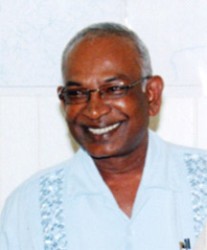Arguments yesterday began on whether the elections petition filed by the opposition PPP/C’s Ganga Persaud has material facts in order for the case to proceed.
This is in light of Chief Election Officer Keith Lowenfield’s challenge to the petition, which he has asked the court to strike out on the grounds that the substantive submissions disclose no reasonable cause of action. The matter is being heard by acting Chief Justice Ian Chang, at the High Court, in Georgetown.
After the in-chambers hearing yesterday, Lowenfield’s attorney, Roysdale Forde, explained that because of the nature of all the applications that have been filed, the Chief Justice decided that he should first hear the arguments regarding material facts.

Forde noted that this will be done as a prerequisite to determine whether thereafter any need would still exist for going into the substantive elections petition case.
He said Persaud’s failure to file certain types of material in the elections petition renders it bad and so the Chief Justice has logically decided that he should first hear that before hearing anything else.
Meanwhile, Persaud’s lawyer, former Attorney-General Anil Nandlall, noted that Lowenfield’s summons seeks to strike the petition down on grounds that include “the failure to provide sufficient information.” However, Nandlall said the action filed by Persaud is intended to call upon the Lowenfield to produce certain information and documents which are by law in his exclusive possession.
To Forde’s argument that sufficient facts have not been pleaded to support the reliefs which are being claimed in the substantive petition, Nandlall said he disagreed as the petition details more than 28 grounds.
“We could not have pleaded any more than what we have pleaded,” Nandlall emphasised. “But yuh know, he has to present arguments of some type,” he added.
Highlighting previous cases, the former AG said that at this stage he thinks that the Guyanese courts are very experienced in treating with contentions of the type advanced by Forde.
“I can only plead facts based upon what actually transpired,” Nandlall said, “and you would see about rejected ballots; facts are pleaded in relation to that, in relation to the refusal of the returning officer to grant a final general count; facts are pleaded about that, the fact that many rejected ballots should not have been rejected; facts are pleaded about that.”
Nandlall maintains that for each ground being contested by the other side, there are sufficient facts pleaded to support them.
The matter has been adjourned to September 28, when the presentation of arguments would continue.
Lowenfield has asked the High Court to strike out the elections petition, saying it is “materially defective” because it fails to establish any grounds to vitiate the polls.
In an affidavit in support of summons, Lowenfield asks that the petition, dated June 24, be struck out and argues that the substantive submissions disclose no reasonable cause of action, and are frivolous and vexatious.
He argues further that some of the submissions are in breach of the Representation of the People Act, which prohibits the deliberations of the Guyana Elections Commission (Gecom) and communications between commissioners regarding its business from being admissible in court. In his affidavit, Lowenfield says he believes that the statements in Persaud’s petition are “insufficient” to establish a cause of action and that the “absence of material facts” results in no foundation being laid for grounds to vitiate the elections.
The opposition party’s position since the May 11 general elections is that it has been robbed of votes through a carefully planned rigging process on the part of the APNU+AFC coalition.
In the petition, Persaud called on the court to declare the entire elections process flawed, and containing many procedural errors and so many instances of fraudulent and/or suspicions actions that “the results that have been derived from the process cannot be credibly deemed to represent accurately the will of the electorate.” He also asked the court to order a recount of all ballots cast in the elections.
Local and international observers have declared the polls free and fair.





